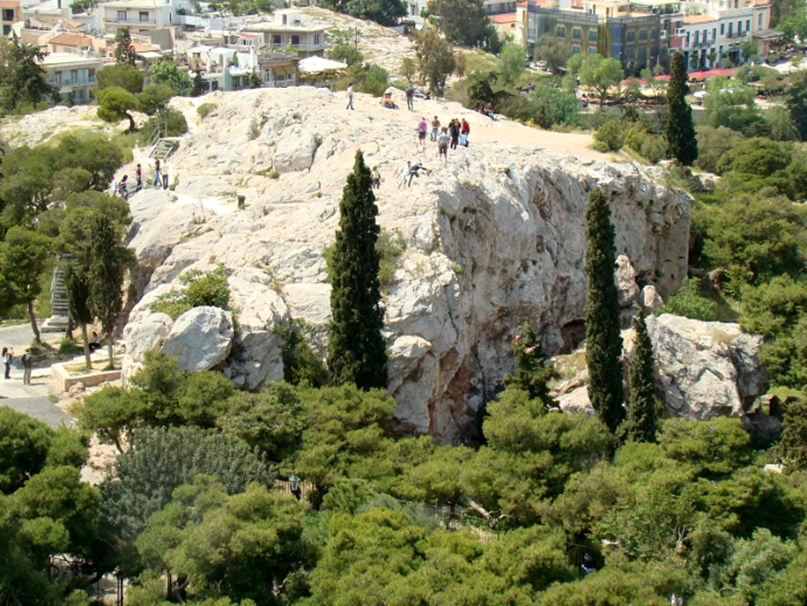Paul the Apologist in Athens -- a study of Acts 17
- mww

- Jan 11, 2018
- 14 min read
Updated: Apr 10, 2025
Are we ready to share Jesus?
Bible Study Ideas and Commentary for Acts 17
People everywhere need the Lord and are seeking Him, even if they are making things extra-difficult on themselves through self-made religions and philosophies. If God’s people humbly model and share the truth, God Himself will cultivate whatever seeds are planted.
What you worship in ignorance, this I proclaim to you. (17:23)
[This Bible study supplement focuses on background information of Athens and its influence on the world. The passage is rather straightforward.]
Getting Started: Things to Think About
Wise Sayings.
Ask your group what kind of “wise sayings” still influence them today. They can be great or off the wall. Give some examples to help them start:
Early to bed and early to rise makes a man healthy, wealthy, and wise.
All work and no play makes Jack a dull boy.
A penny saved is a penny earned.
A stitch in time saves nine.
Train a child in the way he should go and when he is old he will not depart it.
Measure twice and cut once.
Speak softly and carry a big stick.
A chain is only as strong as its weakest link.
A house divided against itself cannot stand.
(If you want more, go to www.phrases.org.uk/meanings/proverbs.html) Hopefully your group would realize that the whole point of those is to influence someone’s actions. "Wisdom" is something to be acted upon. As a Christian, we need to make sure that our little “proverbs” that come to mind are biblical. (Unlike Ben Franklin’s “God helps those who help themselves.”) Those are all philosophies. And the people around us live by all manner of philosophies. They shape our priorities and our choices. And it can be really hard to share Jesus with someone who has a strong and unbiblical philosophy.
The Most Amazing Man-Made Places.
In our passage, we will read about Paul in old Athens. It was one of the true wonders of human civilization—something its inhabitants were really proud of. So when Paul came around to talk about a God who was much, much greater than their own building projects or philosophies, they were immediately biased against him. In other words, they got caught up in what they could do on their own—why would they need God? Have group members mention some amazing things they have seen as a way of reminding everyone how we can all be impressed by human ingenuity and creativity.
This Week's Big Idea: Athens
Athens - The Hub of All Western Thought

By Paul’s day, Athens had long begun its steady decline. Greece had been utterly unique among the ancient civilizations in that rival cities (think Athens, Sparta, Corinth) insisted on being independent from one another. They moved away from the “divine right of kings” or hereditary dynasty to the idea of the self-rule of law. Along with Judeo-Christian ethics, this would be one of two pillars for all of western civilization. Athens sprung to world notice around 500BC when they defeated the invading Persians (see Esther) and began throwing their weight around other cities. This was the “golden age” of Athens and the birth of modern democracy—every male citizen had an equal vote in the matters of the city. Eventually, their ambitions turned inward, and their massive building programs (Parthenon, Acropolis, etc.) caused them to get money from nearby cities, and subsequent wars led to all of the Greek city-states being easy targets for Philip of Macedon around 350BC, whose son, Alexander the Great, would go on to conquer the known world. So really, the idea of city democracy only lasted a little more than a century, but it took deep root among the people.

Here’s what matters for our passage. Rome eventually conquered the Greeks. But Rome was populated and led by farmer-soldiers. They did not have a culture of philosophy, arts, or high culture. Athens did, and as Romans became wealthy from their world conquests, they started wanting the “finer things” in life, and they turned to Athens. Athens was world-famous for its schools of music, art, history, drama, and learning—all of which dated to the “golden age”. Rome granted Athens the status of “free city” and emperors would eventually build major public works there. In Paul’s day, all of the “smartest” (or “thought-they-were-really-smart”) people in the empire went to Athens to learn philosophy, make a name for themselves, or get credentials for starting their own schools.
So, when Paul shows up talking about their philosophies and gods, he is the proverbial hick showing up at Harvard to start lecturing in the park. If there were any cracks in his argument, they would have been exploited immediately by the ambitious students of Athens. If Christianity can impress in ancient Athens, no one alive today can claim to be “too enlightened” to listen.
The Acropolis
One of the most famous and breathtaking sights of all human civilization (with the pyramids and the Great Wall) is the ancient Athens Acropolis. Built on an outcropping overlooking Mars Hill and the agora during Athens’s Golden Age (mid 400s BC—during Aristotle’s lifetime) by the great leader Pericles, the original construction included the massive Parthenon (a temple to Athena filled with exquisite statues), the Temple of Athena, the Propylaea (the giant colonnade gate), and the Erichtheon (a temple to Athena and Poseidon).


Athena—the version that was around in Paul’s day—was the goddess of wisdom and war, and she was the patron god of Athens (like several other towns). But Athens became so important that it gave Athena her name. Having her temple overlooking the city reminded everyone of “who was in charge”. No one in the city could get away from it. That would make Paul’s job very difficult—it entailed directly telling the people of Athens that their “patron god” did not really exist and everything they had been taught was a lie. Being that kind of missionary is tough!
The Agora
The “agora” is the Greek marketplace; every Greek city had one. Commerce, education, and litigation all happened there. The one in Athens is the most famous, and structures of it still exist. The basic layout was complete by the 5th century BC; in Paul’s day, Rome had added additional monuments to Roman priorities.
In the picture, you can see how complex the whole area was. By Paul’s day, the Roman forum had taken over as the social hub of the city, and the agora was more of a museum. What you can see are the titles of the buildings. Note these: altar of Zeus, statue of Hadrian, temple of Monopteros, statue of Triton, monument to fallen heroes, temple of Ares, altar of the 12 gods, temple of Helen, temple of Apollo, generic “temple”, and a whole bunch of statues, inscriptions, and murals. Think of it as the Mall in DC except with people worshiping the statue of Lincoln.
Needless to say, Paul had direct access to countless elements of Greek mythology (some Roman) just right here in the Agora. He could have walked from place to place and offered a new sermon in each one, tailored to the people who were gathered at that area.
Mars Hill—The Areopagus
In Paul’s day, the term referred both to the hill and the council of leaders who regularly met on it. Mars Hill is an outcropping of rock in between the majestic Acropolis (the picture is a view from the Acropolis) and the marketplace (Agora). The council had heard of Paul’s sermons below and asked to hear from him directly.
Bonus Big Idea: The Philosophies of Ancient Athens
If you have interested learners, they might find this information valuable:
The Sophists: the First Philosophers. The people who started the idea of self-rule believed in human ingenuity, but they had to remove the influence of the gods from people’s thoughts. Therefore, they taught that every human idea was valid and had a right to be heard. This was very effective for building a law code, but it led to relativism, that every thought was true in its own way and equally valid.

Socrates (470-399 BC), who lived entirely during the golden age, was the father of our understanding of philosophy. He said that the Sophists were wrong for believing that all truth is relative—logic and rationality were universal. He taught the “Socratic Method” of finding truth through relentless questioning.
To Socrates, humans should purify themselves through instructive discussion.
Plato (427-347 BC) was his student. Plato believed in the primacy of the intellect/mind. Our senses are not fully trustworthy, and the world around us changes too quickly for us to observe it accurately. He believed that all truth can be determined through logic, reason, and mathematics.
To Plato, humans should live entirely driven by reason and logic.
Aristotle (384-322 BC) was his student, and he was quite famous for being Alexander the Great’s private tutor. Aristotle was probably the pinnacle of all philosophy. He believed in harmony and symmetry; he observed the “Golden Mean” and “Golden Ratio”. He also believed that the universe operated according to absolute rules, but those were determined empirically—through testing.
To Aristotle, humans were happiest when they lived rationally within their place in society.
Epicurus (341-270 BC) followed Aristotle but taught in addition to happiness from virtue and moderation that happiness was found in pleasure—defined as the absence of pain and confusion. Momentary “highs” were rejected for enduring pleasure (like meditation).
Zeno of Citium (~330-264 BC) followed Plato and founded the school we now call Stoicism. His emphasis on logic led to a very dispassionate approach to people (including the self). Every emotion, every decision should be measured by reason alone. Pain, displeasure, and suffering could all be ignored for logic’s sake.
Those philosophies were not just still dominant in Paul’s day, they continued for a long, long time. Emperor Nero (remember him?) was a Stoic. Philo, the philosopher who influenced arch-heretics like Arius and Origen, was a Platonist. The Enlightenment happened when scholars rediscovered Aristotle’s teachings. In Athens, Paul was going against the “heaviest hitters” the human race has known.
Part 1: The Unknown God (Acts 17:22-23)
22 Paul stood in the middle of the Areopagus and said, “People of Athens! I see that you are extremely religious in every respect. 23 For as I was passing through and observing the objects of your worship, I even found an altar on which was inscribed, ‘To an Unknown God.’ Therefore, what you worship in ignorance, this I proclaim to you.
After getting out of jail in Philippi, Paul and crew travelled to other cities, sharing the gospel. But they also picked up a trail of hateful Jews who followed them around for no other reason than to stir up trouble for them. So, in wise form of de-escalation, they sent Paul ahead to Athens. What did they expect Paul to do while hanging around in the hub of learning in the Roman Empire? The language makes it seem that Paul attracted enough attention to himself that the leaders and teachers of the city summoned him forcefully to “explain himself”.
Preaching to the Areopagus would be a new challenge—this audience did not have a shared Jewish background from which he could easily share the story of the Messiah. Rather, this is apologetics—explaining the Christian faith “from scratch”. Of course, Paul did it brilliantly. He starts with something objective, something they can agree on (an altar to an unknown god) and goes from there.
You don’t have time to go into a discussion of apologetics (even if you really, really like that topic!), but you might ask this question: If someone came up to you and said they don’t believe in God, how would you convince them otherwise?
Part 2: The Known Creator (Acts 17:24-29)
24 The God who made the world and everything in it—he is Lord of heaven and earth—does not live in shrines made by hands. 25 Neither is he served by human hands, as though he needed anything, since he himself gives everyone life and breath and all things. 26 From one man[e] he has made every nationality to live over the whole earth and has determined their appointed times and the boundaries of where they live. 27 He did this so that they might seek God, and perhaps they might reach out and find him, though he is not far from each one of us. 28 For in him we live and move and have our being, as even some of your own poets have said, ‘For we are also his offspring.’ 29 Since, then, we are God’s offspring, we shouldn’t think that the divine nature is like gold or silver or stone, an image fashioned by human art and imagination.
Paul uses a common argument: everything had to come from somewhere (and his audience would have agreed). But here is his twist: if a god could create the universe, why would he need people to build him a temple and serve him? The Greek gods were flawed, limited, and vain (kind of like people), and Paul explained that a true God would be nothing like that. How could the God who gives life need anything? Paul goes on to an important argument about human ancestry. Athenian mythology said that they sprouted from the soil of Greece, making them superior. Not only was that incompatible with the Bible, it would make listening to an outsider like Paul hard to do. God, the true God, made all people and was sovereign over all people. By extending that to “nations”, Paul set things in terms of the Greek and Roman Empires—no matter how great they were, God still determined the length of their days. Paul then tied this back to his audience: God set such things in motion so that people (like the learned Athens philosophers) would seek to understand history and humanity and thus seek God. Paul hammers this home by quoting a Greek philosopher (this could come either from Cleanthes or Aratus), not to say that the Greeks were right, but to point out that “all truth is God’s truth”. I think of this as a way of “throwing a bone” to his audience, that their leaders have gotten some things right.
His final point about idols is interesting. Greek philosophers understood that worshiping/serving idols was silly. But the people were utterly devoted to the practice. What does that say? That “common” people are more superstitious and “educated” people aren’t good at teaching? There might be some of that. There’s certainly a little mistrust between "classes" (still is today). What do we do with that information? Personally, I am against superstitions, and I believe that educating people in the truth of God can help overcome those practices. But I need to be careful that I don’t make Christianity an exercise of the mind rather than a loving relationship with the God of the Universe.
Part 3: Judgment by the Son (Acts 17:30-31)
30 “Therefore, having overlooked the times of ignorance, God now commands all people everywhere to repent, 31 because he has set a day when he is going to judge the world in righteousness by the man he has appointed. He has provided proof of this to everyone by raising him from the dead.”
Paul gives us our most important lesson about apologetics: apologetics is not about winning arguments; it is about sharing the gospel. Paul wasn’t trying to be interesting; he was getting to a point: if this God truly exists the way your philosophies say He might, then don’t you think He cares about what people think of Him? In other words, if you believe that a Creator God is a reasonable deduction from life, would that also make Him the God sovereign over death? If you truly believe that, why would you allow people to willy-nilly continue in their foolish idolatry?
It’s a threat they would understand. How seriously do they take their own philosophy?
Everything Paul has said about this “unknown god” is a reasonable conclusion, particularly tracing the curve out into death and judgment and the potential of life after death. It only makes sense. God did not just create the Jews (or the Greeks) but everything, and thus He will hold every human to account. We learn from 1 Corinthians why Paul believes that the resurrection is central to Christianity, but he introduces it here to a hostile audience. Why? Because this is a key difference: many Greeks believed that the afterlife was purely spiritual (that the physical universe would be destroyed). If his audience could follow him through this development, they could take the leap to the full truth of the Bible. It’s like saying in your first conversation with a Muslim that Allah is not God. You’re going to have to say it eventually. Paul knew the thinking patterns of his audience well enough (having talked to them before) to know what was really important.
Part 4: Split Decision (Acts 17:32-34)
32 When they heard about the resurrection of the dead, some began to ridicule him, but others said, “We’d like to hear from you again about this.” 33 So Paul left their presence. 34 However, some people joined him and believed, including Dionysius the Areopagite, a woman named Damaris, and others with them.
Not surprising, the response was mixed. Some heard the truth and were convicted, some rejected it. Kind of like today. An early historian said that Dionysius became the first pastor of the church in Athens. There is certainly some reason why these two people were mentioned by name. But it’s important to note that Paul soon leaves Athens, and we never hear of it again. We get the impression that no church was started there at that time. We really don’t hear much of anything from Athens for hundreds of years. A church existed there because citizens of Athens show up in various Christian letters, but it must have been small. Not even the Apostle Paul was completely “successful” in human terms.
Here are two ways you might try to apply this lesson to your group. What’s the toughest lesson you’ve ever had to learn? What made it so hard to learn? It might be something about a habit, about life, about a skill. In my experience, the hardest lessons are the ones where we have to un-learn something we’ve always believed. Or where they go against a belief you’ve cherished (like maybe your first experience with death or loss or tragedy). How can your tough lessons and the way you’ve grown through them help you share the gospel with people around you who would have some major soul-searching to do if they really listened to what you have to say?
Secondly, you might just ask for a list of questions/problems that people have with Christianity. Here’s the thing—you can’t let your class just say stuff about being hypocrites. Those are complaints about the messenger, not the message. What intellectual and philosophical problems do people have with Christianity? I hear things like “they don’t believe in God” “they believe in multiple ways to God” “they don’t believe in hell” “they believe the Bible is just another book”. What have you heard? Then, in super-quick summary, how does Paul’s speech in Athens help us answer those questions? I think Paul’s speech is amazing in the number of big-deal topics he covers. Remember—we cannot intellectually convince anyone of spiritual realities; that’s between them and God. But we can present the truth.
If Paul is right (and of course he is), that means people are searching for the truth. We need to help point them the right way. What are all of the things we can do to help (and hurt) that search? Ask God to put you in a situation to tell someone that God lets Himself be found by anyone who looks. Pray that you’ll be observant and ready.
Closing Thoughts: Modern Philosophies
Unfortunately, people in America today aren’t terribly consistent with their beliefs and actions, so people you know might be all over this list . . .
Naturalism: the “scientific method” is the only test for truth and reality
Existentialism: the world is meaningless and disorienting; we need to “let go”
Poststructuralism: there is no sense in searching for patterns in society
Postmodernism: humans are no better than animals, no more able to find truth
Humanism/Atheism: the meaning of life is determined entirely by humans
Pragmatism: beliefs should be measured by usefulness, not reality
Marxism: material wealth is the driving force behind all human behavior
Nihilism: because nothing exists “out there”, nothing really matters “here”
Utilitarianism: “good” is what brings the most happiness to the most people
Basically, each one of those philosophies (which float around our country) is either from ancient Greece or a direct reaction against ancient Greece. The nice thing about that is we have centuries of Christian thinkers writing about them, so we aren’t on our own in dealing with them. Every politician, every business leader, every church leader—all act out of some kind of human philosophy. Knowing what it is can help us communicate effectively with them.














Comments